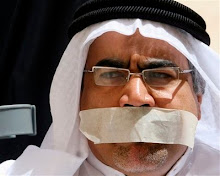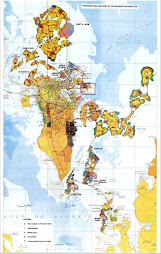حق: حركة الحريات والدموقراطية- البحرين
مكتب حقوق الإنسان ..Human Rights Bureau
www.haaq.org, Email: HAAQ.Bahrain@gmail.com
NSA enters the front line against the UK to influence its decisions on political asylum for Bahrainis
Fabricating a security play to flare the UK sentiment against Shia citizens
The HAQ Movement of Civil Liberties and Democracy believes that it the incident of hurling a stun grenade at the British Embassy in Manama, several days ago, followed by the arrest of two young men from the Shia neighbour to the embassy, was not innocent or coincidental. This belief was asserted in the statements, which coincided with the incident by a group known of its allegiance and sectarian orientation, which adds to the suspicion of the role of the National Security Apparatus (NSA) to increase pressure on the United Kingdom to adopt a tougher stance towards the opposition abroad and those granted political asylum there. The security role in the British Embassy affair reflects a sign of frustration by the Bahraini foreign diplomacy in the quest to influence British domestic politics with regard to laws relating to granting political asylum to many Bahraini political activists and human rights defenders who have been forced to take refuge in Britain after being targeted and the pursued by the NSA inside Bahrain.
The Authority has exploited a recent meeting between members of Al-Wefaq Society with the British ambassador in Bahrain, who asserted that the meeting was not out of the ordinary and was preceded by many similar meetings with delegations of other associations, as this falls under the embassy's policy of being open to all forces of society, as per the ambassador. This was accompanied by a media campaign, lead by newspapers, radio and electronic forums, and supported by statements and sermons of Friday prayers, by individuals and groups of known political orientation and sectarian sentiment. This went on the media attack on the British ambassador to the extent of calling for his expulsion after being accused of "interfering in Bahrain's internal affairs and inciting against the government". The campaign included a demand by some 240 majlis (A majlis is a guest hall in houses open to public) in Bahrain, through a paid advertisement published in a full-page in some newspapers sponsoring the campaign. The advertisement denounced the intervention of the British ambassador in internal affairs, calling for his expulsion from Bahrain. The campaign culminated in a protest outside the British embassy consisting of some figures, at the forefront of the campaign, known of its support for the authority and the declared hostility to citizens belonging to the Shiite sect. The Security authorities - unusually -facilitated the picketing, and allowed the media to highlight the small scale event

Khalifa Abdulla Al-Khalifa- President of NSA, former Ambassador to UK

Khalifa Ali Al-Khalifa- Ambassador to UK, former NSA President
At the diplomatic level and in the past two years, many of Bahraini officials visited the United Kingdom and met with their counterparts in the British government, including the foreign and interior ministers. This was also followed by meetings conducted by the British Ambassador, alone or accompanied by numerous delegations from London, addressed talks about the annoying opposition on the UK soil. All attempts to pressure UK officials failed to achieve a sought objective of withdrawing asylum granted to Bahraini nationals who have found England a safe haven for them, away from the influence of the security apparatus in Bahrain.
Reports indicate that the British Security Service has been aware of, and in coordination of the visits made by delegations of the security apparatus to harass activists in London, and of the physical attacks made against some of them, followed by threats. It should be noted that some opposition activists in London (Abbas Al-Omran and Ali Mushaima) were beaten in the street by faced-masked men, and later received phone threats from the same attackers threatening of future assaults if not ceasing to harass the Bahrain Ambassador to the United Kingdom. The security services in UK have not been able, so far, to identify who stands behind that assault. During the same period, the house of Dr. Saeed Al-Shehabi was the subject of arson fire emanating from outside the house at pre-dawn time. The blaze caused burning of some external parts of the house after the awakening of its residents and containing the fire before it spreads.
When all these attempts failed, followed by the refusal of the British ambassador to respond to the request of an open meeting called upon by some figures of the campaign against the United Kingdom, the role of the security apparatus came in perspective using sectarianism to move the embassy and the position of the British Foreign Office against the dissident refugees in Britain, who belong to the Shiite Muslim community.
On the evening of Monday, March 16th, and during the presence of British Ambassador participating in an undeclared event, a stun grenade was thrown at the building of the embassy on the side located near a Shi'ite neighbourhood in Ras Al-Rumman- Manama. The security apparatus announced instantly the arrest of a young man (17 years) from the same region claiming that he had confessed the responsibility for the attack on the embassy and was handed over to the public prosecution for investigation. Reports indicate the detention of another 14 years old boy, accused of the same charge.
On the next day of the "suspicious" incident, statements from the frontiers of the campaign against the United Kingdom and its Embassy in Bahrain refer to the sectarian dimension in the attack and linking it to the sectarian background of the detained young men. In some of the statements, it refer to "the intense security checks, photographic equipment and control which contributed to the arrest of defendants in this terrorist act, which shows that its executers belongs to Ras Al-Rumman, known of its ideological dissident orientation. This increases the likelihood of the opposition's role in this process". In another place of the statement; " Suspicion hovers over who threw a Molotov cocktail, which indicates the likelihood of a predetermined plan by the opposition who are sheltered and given political asylum on its territory" (meaning Britain).
It should be noted that the location of the current embassy in the capital Manama, has not changed for more than twenty years, and there was no single report indicating that it was not, for any reason, subjected to any kind of attack by its neighbours living next door or from someone else.
It is believed that the Bahraini pressure onto the United Kingdom and despite the resistance of the latter, has affected in hindering recent asylum applications for activists known to have been targeted by the local Authorities. Moreover, The British Embassy hampered and sometimes refused to grant visas to a number of human rights activists, and to those assumed by the Embassy to be affiliated with the opposition, expecting that they will participate in its activities when they travel to London. It is also thought that there is security cooperation between security authorities of Bahrain and the Britain with regards to monitoring of the Bahraini activists affiliated to the opposition and the events such as symposia, press conferences and sit-ins, that are usually held in front of the Bahraini embassy in London or the venue place of events where there are official delegations.
Despite the statement of the Bahrain Foreign Ministry exhibiting concerns about what happened to the embassy and vowed to protect foreign missions, suggesting the involvement of non-official bodies in the incident, HAQ movement believes that the British embassy has been targeted under a scenario of an integrated means led by Bahraini security apparatus who are accustomed to security plays against opposition activists and defenders of human rights. HAQ therefore calls for the following:
1 - Unconditional release of the detainees in this incident, which was plotted and orchestrated- as evidence suggests- by the notorious National Apparatus.
2 - Cease playing on the sectarianism strings and deployed sectarian avengers to disturb the relations between citizens of different faiths and sow divisions among them.
3 - Stop harassment of activists and human rights defenders and the security plays targeting them.
4 - The British Government should not give up to this multi-faceted pressure and insist on complying with the international standards for refugees for political reasons, and rather put a pressure on the Bahraini authorities to stop the ongoing campaigns against dissidents at home and abroad.
March 26, 2010







